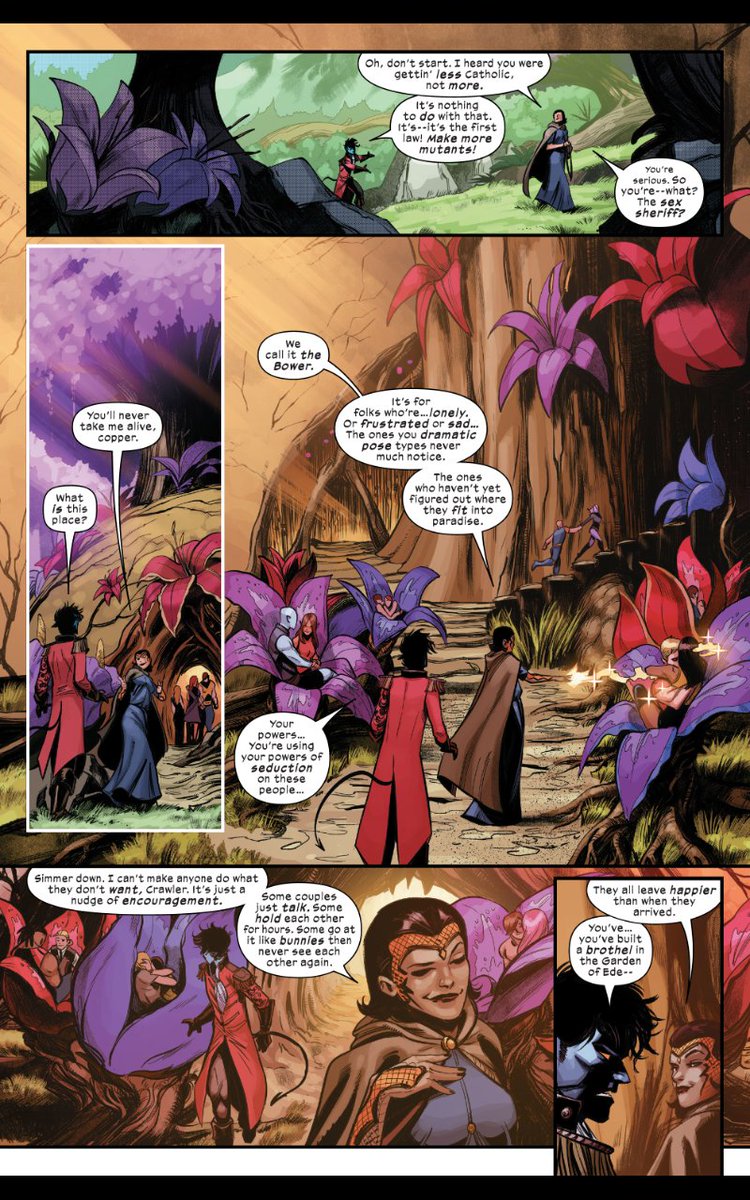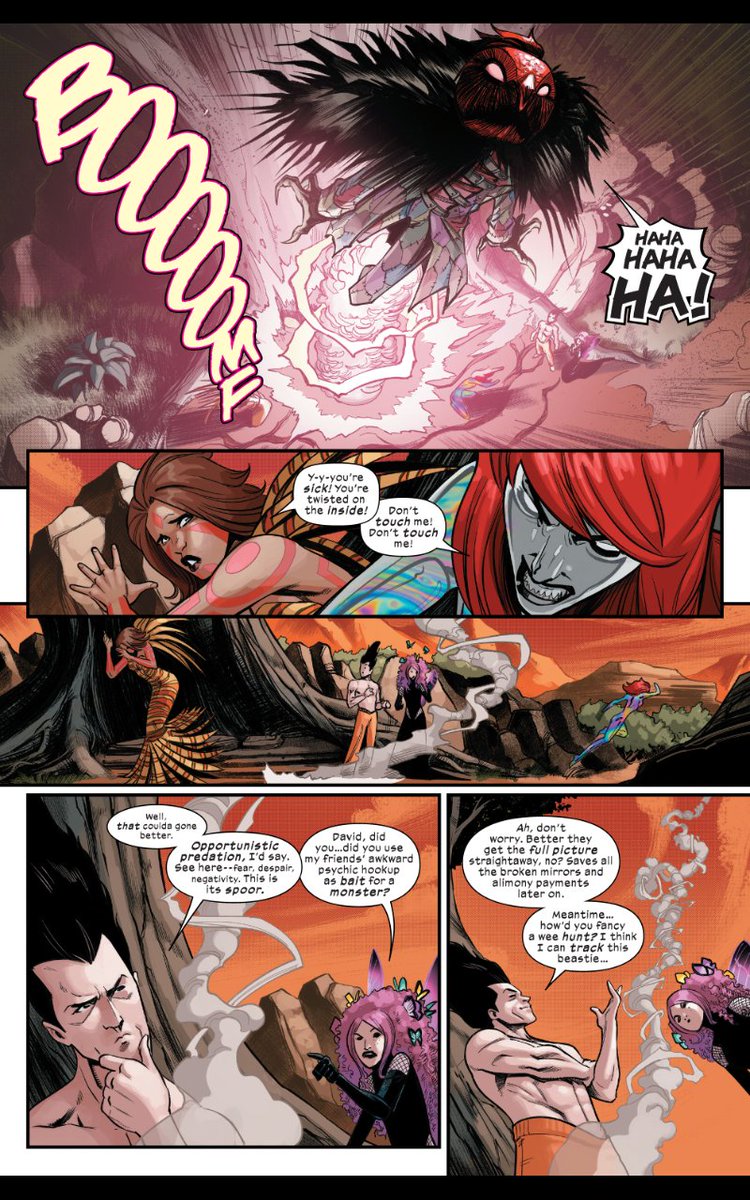"I don't know. I don't care. The more I observed him, the more my skin crawled, so I gave up and went home to re-gene some psychedelics and eat expensive chocolate. Sometimes a [REDACTED] is just a [REDACTED]."
Reviews on the most notable classics as well as the current run for the MARVEL NOW!
Saturday, September 11, 2021
Way of X issue #4 by Simon Spurrier
Saturday, September 4, 2021
Way of X issue #3 by Simon Spurrier
I mean, it's probably best to assume the worst about your gay dads. They had let you down before.
Monday, August 30, 2021
Way of X issue #2 by Simon Spurrier
"Did you know a Nightcrawler is a type of worm? It's blue, and it's disgusting. Not a clever insult, but one I heard many times as a child. So I took it, and I made it mine. You are not your flaws, David Haller. And if destroying a lump of empty meat will you start afresh? To rule yourself? Perhaps there are sins worth sinning."
Sunday, August 29, 2021
Way of X issue #1 by Simon Spurrier
I knew, of course, that it was only a matter of time before Chuck comes back from one of his many not-so-permanent deaths, so when I opened the pages of this first issue, it didn't shock me to find him up and about in the very first panels. He's also walking. He's got this badass new costume design. I'm not questioning the logistics of these characters anymore. I just accept that they're there or they're not. It's how the X-Men roll.
From what I can glean so far, the new haven all mutants are living on is Krakoa...and that it's no longer the same sentient island from before, or at least not nearly as destructive? Also, they mentioned the Scarlet Witch's Decimation in which she willed he mutant gene into non-existence during House of M. That plays a considerably crucial role with whatever is up with the new generation of mutants who are able to die in content because resurrection, apparently, is at hand within Krakoa. So...all mutants are immediately life-sustaining, but they do have to undergo this Crucible thing. Essentially, mutants whose genes had been eradicated because of Wanda's curse would come to Krakoa, seeking rebirth, but they have to die through gladitorial combat.
Yeah, if you're me, and you haven't read a single X-Men issue in the last five years, all of this is just confusing yet somehow very intriguing, as most X-Men premises start. Luckily, there werebreaks in the pages which include the notes of Doctor Nemesis and maybe a diary entry or two from whom I assume was Kurt Wagner (Nightcrawler) himself. According to the page that explained how the Crucible works: "Petitioners (who must select their own slayers) are generally victims of the so-called Decimation event...in death, these individuals earn the right to resurrection and hence, a restoration of their mutant powers.Crucible is thefore billed as offering a measure of dignity to one who seeks death and reincarnation."
(It's worth mentioning that trusting the judgment of the science guy who admittedly and visibly grows 'conscious-altering psychedelics out of his own cerebellum' may not be the best choice, but next to Kurt, he seems to have a more practical insight than the rest.)
This is how I understand it so far: all dead mutants can come back to life for this continuity, but to die in the Crucible held in Krakoa with a mutant slayer of your choice would expedite the resurrection. There's also this part in the notes: "We are seeing a new evolutionary mechanism at work. Selection by means of prejudicial resurrection." And that's because 'a swift return is a just reward for a courageous death'.
So if you're a mutant who died out of the Crucible, your return to life may be delayed since there's a 'backlog'. But if you take your chances with the Crucible and die there, you can come back, oh, I don't know, within 24 hours? I don't know who decided, how and why, but everyone has just come to accept it. Conveniently. Worryingly. Huh.
The existential dread and paranoia that this type of premise awakens in the back of mind cannot be ignored as I kept reading. This new status quo in new Krakoa where the youthful generation of mutants do not see death as an ending or traumatic game-changer will definitely open doors to something more dangerous. This is some messed up shit, even when you take into account the X-Men standards and levels of fuckery. No wonder Nightcrawler is highly disturbed. Speaking of characters we all know and love...
There was an interesting page in which Doctor Nemesis and Nightcrawler had a brief yet frank discussion about the weird circumstances at hand. Doctor Nemesis mocked the fact that Nightcrawler was still a steadfast Catholic in spite of what he is and all the miracles he'd seen that should have extinguished such an outdated religious belief in the context of mutant evolution. He said, "I mean, really, you leotard-wearing types have locked horns with more actual gods than I've endured suboptimal lattes. Why is it that the only one whom we've seen no trace is the very one you continue to honor." To which Kurt answered, "Have you considered that that may be why I continue to honor Him?"
Dr. N was still unconvinced so imparted this rationale: "Alien life, metaphysical entities and the overthrow of mortality itself. What does a credulous little believer do when all the big questions have been answered?" Once more, Kurt astutely offered:
To me, this was first layer that has already captivated me, and based on the first issue alone, I could already tell that Way of X has the makings of a very multi-dimensional story. I'm invested to learn more about Kurt Wagner's position and the nuances of his struggle where his faith is concerned. While characters like Charles Xavier and Erik Lehnsherr seemed almost static and resigned, adapting to new circumstances in the same mold they've always done things (Magneto who's always ruling with his fist and relying on forceful tactics, then Professor X who will provide sound counsel yet still just as detached from the more complicated workings of the heart, including his own), Nightcrawler was more willing to admit he was on shaky ground and didn't want to cling to the same methods since he recognized that this new status quo eludes and can possibly unleash consequences more damaging than what they endured during Decimation.
It's also interesting to note that these new X-Men kids acted and spoke more carefree than the jaded, wise-cracking batches that I've encountered across previous titles--young fighters who disguised their trauma through humor and kinship with one another. And why wouldn't they be so carefree? This mutant generation has conquered death. They have nothing to fear, not even the prejudice of humankind. During the second scene of the issue, these kids didn't seem to see their human enemies nearly as the threat they used to be decades ago. They may even pity these humans because the odds have now tilted in their favor, which was how Pixie, Loa, DJ, and others could waltz into a museum cataloguing works of the so-called mutant menace and afford only a wry smile. It's touching they could live in a world in which they no longer have to feel powerless and unloved, but neither can they recognize the important sacrifices of the last few generations who had suffered for the rights they now enjoy. I suppose we can say that about Generation Z, and Nightcrawler is the eldest millennial caught in the middle.
In relation, there was also this creepy mention of 'The Patchwork Man', whom I believe was a bogeyman the mutant kids had created as they allow their imaginations to run wild regarding monsters because--le's face it--they have no real monsters to fight nowadays. The fact that the youth brought it up as one of the older mutants was in the middle of teaching them about the impact of Wanda Maximoff's Decimation was illuminating. For this mutant generation, they don't find the Scarlet Witch nearly as threatening as the fictitious Patchwork Man they created and passed around as a lively urban legend. It's eerie, and only Kurt--and to a lesser extent, Doctor Nemesis--has concerns as what new horrors may come upon this Brave New World where peace and harmony have been achieved but only perhaps on the surface. Meanwhile, Professor X admitted he had been an abysmal father for so long and so encouraged Kurt to take the mantle instead and pursue where his suspicions lie if it meant protecting this new world they forged. He explained why he and not Jean or Scott was the right person for the job: "For all that I can dissect minds, for all that I can interrogate dreams at will, nonetheless you understand people in the way I never could."
I hope that my insights so far would suffice even if I still might be missing a few more important contexts. I'm sure I'd be able to compensate as I read the next issues. And if I can manage my time better before this year ends, I may be able to pick up another X-Men title from the ongoing 2021 run. For now I'm satisfied that I can even write this review. See you all for issue #2!
RECOMMENDED: 8/10

















